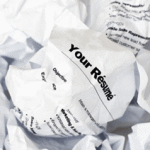Important do cument that the resume is, avoid these mistakes when writing yours:
cument that the resume is, avoid these mistakes when writing yours:
– Citing an objective. Hiring managers do not want to know what your objective is, they want to know how you can help them. You do this with a coherent summary of qualifications leading off your resume.
– Using irrelevant activities. Always keep any activities that you list job relatable. For example, avoid listing that you volunteer at PAWS unless you’re applying for a job at a pet clinic.
– Being inconsistent with tense. For your current job, use the present tense. For already completed achievements and prior jobs use the past tense.
– Listing too many tasks instead of accomplishments. For example, Managed a project team of seven high performance engineers, is a task. Directed a $1M production line redesign project that resulted in 20% more productivity for the second shift, is an accomplishment.
– Placing GPAs and school accomplishments on the resume. Only do this if you are a fresh graduate with little or no work experience and you’re applying for your first job.
The vast majority of the resumes I receive have one of more of these on them.
Steve Wyrostek, MBA, CPRW
Steve is a former manager responsible for hiring hundreds of employees. He has also written over 300 resumes, LinkedIns and cover letters for clients ranging from scientists to entry level grads in the US, UAE, UK, Australia, Canada, France, Mexico, Italy, etc.
He is a Certified Professional Resume Writer and heads up No Cliche Copy and No Cliche Resumes in New Buffalo, MI.
 When preparing interviewees, I often must stress the critical need for their resumes to be crisp and clear. The resumes that stand out are the ones that reflect your accomplishments and how you achieved them. For example, the leader of a sales team may state on his or her resume that the team generated X amount of revenue, exceeding expectations of monthly goals. A strong resume states not only your skills, but the impact you can make on the organization. Be sure your resume and talking points make the individual interviewing you realize that your skills are a good fit for the organization.
When preparing interviewees, I often must stress the critical need for their resumes to be crisp and clear. The resumes that stand out are the ones that reflect your accomplishments and how you achieved them. For example, the leader of a sales team may state on his or her resume that the team generated X amount of revenue, exceeding expectations of monthly goals. A strong resume states not only your skills, but the impact you can make on the organization. Be sure your resume and talking points make the individual interviewing you realize that your skills are a good fit for the organization.

 Avoid using Twitter to express negative thoughts or comments. It is better to use Twitter to promote positive actions like recognizing good service, products, and people. Positive promotion is much more effective than tweeting negative comments.
Avoid using Twitter to express negative thoughts or comments. It is better to use Twitter to promote positive actions like recognizing good service, products, and people. Positive promotion is much more effective than tweeting negative comments. Steve Wyrostek, MBA, CPRW at
Steve Wyrostek, MBA, CPRW at  Information overload is a killer because it can jumble the true issues. Setting a timeline and a process to gather data are the first critical steps to ensure enough data is gathered. Doing the early research to determine what and how much information is needed sets you on the right path to completion. The timeline of when the project or report is due also acts as a finish line. Duplicate and / overwhelming information will only complicate the end result.
Information overload is a killer because it can jumble the true issues. Setting a timeline and a process to gather data are the first critical steps to ensure enough data is gathered. Doing the early research to determine what and how much information is needed sets you on the right path to completion. The timeline of when the project or report is due also acts as a finish line. Duplicate and / overwhelming information will only complicate the end result.






